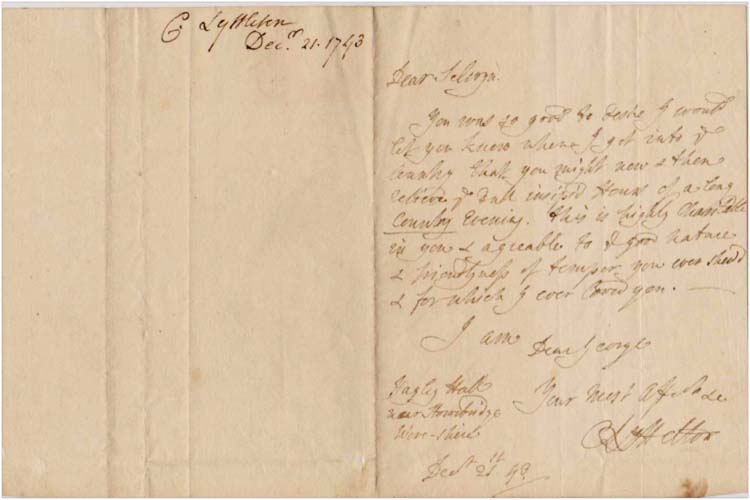

1. From George, 1st Lord Lyttleton.
2. From Rev John ‘Orator’ Henley.
5. From George James (‘Gilly’)Williams..
8. From Madame La Marquise de Stainville.
9. From Charles Townshend, n.d..
15. From Mr. Rogers
Selwyn 1: Letter from George, 1st Lord Lyttleton
In 1742, Selwyn went on the Grand Tour and this was written by Lyttleton sometime after Selwyn came back to England and his return to Eton. Although both went to Eton, I can find no direct reason how they met at that time, Lyttleton being some nine years older than Selwyn.
George, 1st Lord Lyttleton b. 17 Jan. 1709, d. 24 August 1773 was educated at Eton and Christ Church, Oxford. He was Member of Parliament (MP) for Okehampton from 1735 to 1756. In 1741 he was also elected for Old Sarum, but chose to continue to sit for Okehampton. He was one of the politicians who opposed Robert Walpole as a member (one of Cobham's Cubs) of the Whig Opposition the 1730s. He served as secretary to Frederick, Prince of Wales, from 1737, and as a Commissioner of the Treasury in 1744. After Walpole's fall, Lyttelton became Chancellor of the Exchequer (1755). In 1756 he was raised to the peerage as Lord Lyttelton, Baron of Frankley in the County of Worcester.
Hagley Hall, last of the great Palladian houses, and Park are among the supreme achievements of eighteenth-century English architecture and landscape gardening. They remain largely the creation of one man, George, 1st Lord Lyttelton. Before the death of his father in 1751, he began to landscape the grounds in the new 'picturesque' style, and between 1754 and 1760 it was he who was responsible for the building of the house as it is seen today. The original estimate for building the house was £12,000 but the actual cost was £25,823 with a further £8,000 for decoration.
 Large image
Large image
The letter reads [E&OE]:
'Dear Selwyn
You was so good to [illegible] I would let you know where I got into yr county[?] that you might now & then believe yr ....... Hour of a long Country Evening. This is highly charitable in you & agreeable to yr good nature & friendlyness [sic] of temper you ever shew'd & for which I ever loved you.
Hagley Hall I am sDear George
near Stourbridge Your most affect'ate
Worc-shire G Lyttleton